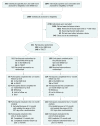Association Between Levothyroxine Treatment and Thyroid-Related Symptoms Among Adults Aged 80 Years and Older With Subclinical Hypothyroidism
- PMID: 31664429
- PMCID: PMC6822162
- DOI: 10.1001/jama.2019.17274
Association Between Levothyroxine Treatment and Thyroid-Related Symptoms Among Adults Aged 80 Years and Older With Subclinical Hypothyroidism
Abstract
Importance: It is unclear whether levothyroxine treatment provides clinically important benefits in adults aged 80 years and older with subclinical hypothyroidism.
Objective: To determine the association of levothyroxine treatment for subclinical hypothyroidism with thyroid-related quality of life in adults aged 80 years and older.
Design, setting, and participants: Prospectively planned combined analysis of data involving community-dwelling adults aged 80 years and older with subclinical hypothyroidism. Data from a randomized clinical trial were combined with a subgroup of participants aged 80 years and older from a second clinical trial. The trials were conducted between April 2013 and May 2018. Final follow-up was May 4, 2018.
Exposures: Participants were randomly assigned to receive levothyroxine (n = 112; 52 participants from the first trial and 60 from the second trial) or placebo (n = 139; 53 participants from the first trial and 86 from the second trial).
Main outcomes and measures: Co-primary outcomes were Thyroid-Related Quality of Life Patient-Reported Outcome (ThyPRO) questionnaire scores for the domains of hypothyroid symptoms and tiredness at 1 year (range, 0-100; higher scores indicate worse quality of life; minimal clinically important difference, 9).
Results: Of 251 participants (mean age, 85 years; 118 [47%] women), 105 were included from the first clinical trial and 146 were included from the second clinical trial. A total of 212 participants (84%) completed the study. The hypothyroid symptoms score decreased from 21.7 at baseline to 19.3 at 12 months in the levothyroxine group vs from 19.8 at baseline to 17.4 at 12 months in the placebo group (adjusted between-group difference, 1.3 [95% CI, -2.7 to 5.2]; P = .53). The tiredness score increased from 25.5 at baseline to 28.2 at 12 months in the levothyroxine group vs from 25.1 at baseline to 28.7 at 12 months in the placebo group (adjusted between-group difference, -0.1 [95% CI, -4.5 to 4.3]; P = .96). At least 1 adverse event occurred in 33 participants (29.5%) in the levothyroxine group (the most common adverse event was cerebrovascular accident, which occurred in 3 participants [2.2%]) and 40 participants (28.8%) in the placebo group (the most common adverse event was pneumonia, which occurred in 4 [3.6%] participants).
Conclusions and relevance: In this prospectively planned analysis of data from 2 clinical trials involving adults aged 80 years and older with subclinical hypothyroidism, treatment with levothyroxine, compared with placebo, was not significantly associated with improvement in hypothyroid symptoms or fatigue. These findings do not support routine use of levothyroxine for treatment of subclinical hypothyroidism in adults aged 80 years and older.
Trial registration: ClinicalTrials.gov Identifier: NCT01660126; Netherlands Trial Register: NTR3851.
Conflict of interest statement
Figures


Comment in
-
Treatment of Older Adults With Subclinical Hypothyroidism.JAMA. 2020 Mar 17;323(11):1097. doi: 10.1001/jama.2020.0942. JAMA. 2020. PMID: 32181843 No abstract available.
-
In older adults with subclinical hypothyroidism, levothyroxine did not improve symptoms.Ann Intern Med. 2020 Apr 21;172(8):JC44. doi: 10.7326/ACPJ202004210-044. Ann Intern Med. 2020. PMID: 32311728 No abstract available.
References
-
- Biondi B, Palmieri EA, Fazio S, et al. . Endogenous subclinical hyperthyroidism affects quality of life and cardiac morphology and function in young and middle-aged patients. J Clin Endocrinol Metab. 2000;85(12):4701-4705. - PubMed
Associated data
LinkOut - more resources
Full Text Sources
Other Literature Sources
Medical
Miscellaneous

